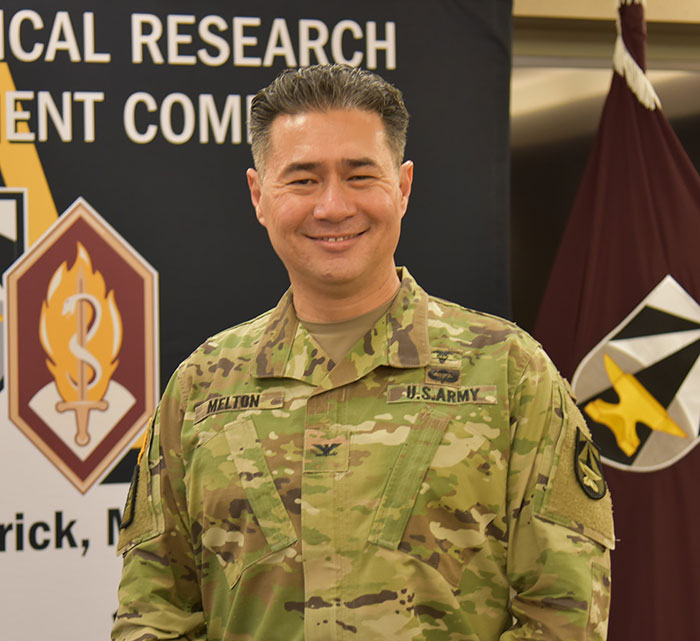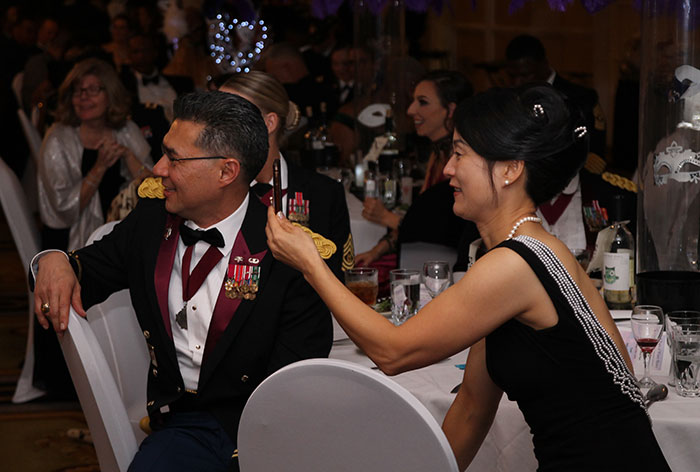As Retirement Nears, Melton Moves On from Lifetime of Service
This article represents the latest in a series of personal interest stories designed to spotlight notable people, stories and achievements across the U.S. Army Medical Research and Development Command. If you would like to recommend a specific Soldier or civilian employee for this series, please contact Ramin A. Khalili, USAMRDC Public Affairs Office Writer, at ramin.a.khalili.ctr@health.mil

There's no point in wasting time as far as Col. John Melton is concerned. That's what three decades in the Army does to a person – makes you more focused, more disciplined. It's to be expected, really. So even though his official retirement date doesn't come around until February of next year, he's finished all the paperwork already, just to be safe.
"I'm on terminal leave right now, actually," says Melton, who until recently served as the Deputy Commander of the U.S. Army Medical Research and Development Command, during an interview in early November. "I'm pretty deliberate in all my activities, so I just went ahead and got it done."
That attention to detail is to be expected given the Melton family's rich service history. Melton's father, James W. Melton, is a retired Sergeant Major who served for 26 years in the Army and further saw combat action in Vietnam. He would later watch his three children likewise join the military to pursue both personal and career goals. For good measure, Melton – the eldest of the three – attended and later graduated from the U.S. Military Academy in West Point, New York; an achievement that sparked his own special contribution to the nation. (Indeed, as Melton likes to say, "military service is a family business.") It's the kind of commitment that – especially these days, especially with his official retirement date so close – that truly puts his entire career in perspective.
"For me, I've always looked at service as trying to figure out how helpful, how impactful you can be for others," says Melton. "And I truly believe that those who serve in uniform, who make that choice, are special – and the people who support them are special, too."
It's that kind of desire that led him down the path of military medicine in the first place. Initially introduced to the Army Medical Department through his father, Melton would later become a Medical Service Corps Officer after graduating from West Point, a choice driven by what he calls an overriding interest in the 'diversity of the experience' – a chance to gain operational experience and work in hospitals as well.
"I was really looking to just do my time and then transition, but along the way I was inspired by a number of influential military and civilian leaders," says Melton, who admits that back in those days he never thought he'd make a full-blown career out of Army service. "And since that time I've had the opportunity to command at every level – including more than 12 years overseas – working in and leading military health clinics, community hospitals, and medical centers around the world."

Indeed, it is those assignments which Melton calls his most professionally satisfying. To wit, before his assignment to USAMRDC in late 2020, he served as commander of the Womack Army Medical Center hospital at Fort Bragg in North Carolina for nearly three years, where he garnered praise for, among other things, his work in directing large-scale reorganization efforts within the Defense Health Agency (the first Army MTF to do so) and for his sizable community outreach efforts via partnerships with the University of North Carolina and the North Carolina Department of Health and Human Services. Further, and as part of the Army's sprawling coronavirus response effort, Melton notably established the use of so-called "fireside chats" to better explain to Soldiers and the public the specifics of Womack Army Medical Center hospital's mission during the pandemic. To hear him tell it, such work is simply an extension of his personal value system.
"In my family, service was encouraged and celebrated," he says. "And so, to be impactful on the quality of life of those that wear and have worn the uniform and their families has been incredibly important to me and guided many of the choices I've made throughout my career."
Now, with his military career winding down – interestingly, upon his official retirement date of February 1, 2022, Melton will have officially served for 29 years, eight months, and one, single day – the focus turns to a new world and, along with it, a litany of new options.
First off is a short stint of rest-and-relaxation before hopping in the car for a lengthy road trip to Seattle, Washington, the state which Melton – a self-described 'Army brat' – considers his official home, and where he notably graduated from the University of Washington with an M.B.A. degree in 2004. From there, he and his wife plan to travel extensively as he is exploring several public, private, non-profit, and academic opportunities ("I enjoy leading large organizations in healthcare delivery and especially public health," he says), though he has not made a final decision yet.
Regardless, wherever he goes and whatever he does, Melton has enough military memories to last him two lifetimes at this point – and he can stand firm in knowing he's contributed mightily to his family's already stout service record. That makes his time at USAMRDC even sweeter as a final assignment – witnessing first-hand the effort that goes into caring for the U.S. Soldier from idea to research to final, fully-realized product; in short, from start to finish. A fitting capstone to an accomplished career.
"I don't think I had an appreciation and understanding of the medical research and development and acquisition space until I came to USAMRDC," says Melton. "There's so many complexities, it's such an impressive team. We have an incredibly noble purpose and a powerful story to tell."














